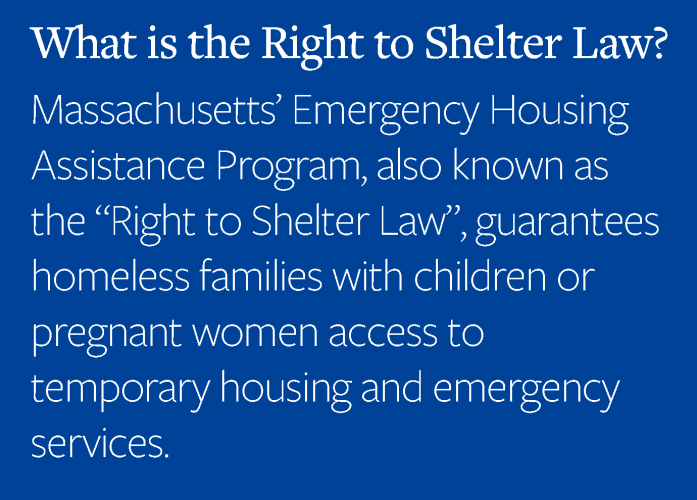Read our statement about closing our Shelter and Stabilization project.
In 2024, HEI partnered with the State of Massachusetts to provide shelter and stabilization services for migrant families who are experiencing homelessness. From May 2024 to June 2025, we operated two emergency shelters in Middlesex County. Our dedicated team of site supervisors, housing and employment specialists, and case workers connected dozens of vulnerable families with the essential services they need to begin their new lives in Massachusetts and become contributing members of their new communities.
Towards the end of 2024, the State’s priorities began to change, and they announced they would begin phasing out hotel-based shelters, including ours. While we had hoped to continue growing and expanding the project, the loss of our USAID funding, combined with the loss of state support, made it impossible for us to continue the project alone. As a result, we were forced to end our shelter and stabilization project on June 30, 2025.
It was an honor and a privilege to be a part of so many families’ lives for the past year. We are extremely proud of what we accomplished and remain ready to serve again.
Overview of the Project
The Need:
According to the Office for Refugee Resettlement, the number of migrants served by the State of Massachusetts grew by more than 1,042% in just two years, from 1,018 in 2021 to 11,633 in 2023. The majority of migrants were fleeing extreme levels of severe, life-threatening conflict in Haiti and other countries around the globe. The U.S. Census Bureau estimates that more than 90,000 international migrants arrived in Massachusetts in 2024, though how many were served by the state remains unclear.

Massachusetts is the only state in the United States with a “right to shelter” law. This law, combined with humanitarian parole programs and other legislation, has led many migrant families to seek shelter and safety in the state. However, the surge in migration has overwhelmed state-run services. In 2023, the Executive Office of Housing and Livable Communities, which operates the state’s Emergency Family Shelter program, began seeking additional service providers to help meet the demand and ensure families receive quality services in a timely, efficient, and dignified manner. In alignment with our mission of serving the most vulnerable and our connection and commitment to the people of Haiti, HEI was proud to become a partner in this important work.
Our Project:
HEI’s shelter and stabilization project connected newly arrived migrant families in Massachusetts with the services and resources they need to rebuild their lives after fleeing extreme violence.
From May 2024 to June 2025, HEI operated two emergency shelters in Middlesex County, Massachusetts, where we cared for 48 families. The majority of our clients were from Haiti, but we also cared for families from other countries impacted by severe, life-threatening conflict.
Besides providing safe emergency shelter, our core services included enrolling children in school; facilitating work authorization and helping adults find stable employment; linking families to health services; helping families transition to safe and stable housing; and helping families gain the skills to independently address their day-to-day needs, such as grocery shopping, banking, and traveling via public transportation—basic tasks that can be overwhelming and complicated in a new country.
HEI also worked in partnership with the communities surrounding our shelters throughout every stage of this project. Building strong relationships with schools, local employers, community leaders, like-minded organizations, and community members helped ensure we were contributing positively to these areas. These relationships also helped our clients feel welcome, supported, and safe as they begin their new lives.
At its end, our program enrolled all children in our care in local schools and helped support their acclimation and progress. We helped the majority of our adult residents find stable jobs and/or enroll in local classes to help them gain essential employment skills. We also helped 19 families move out of the shelter and into their own apartments. The families who were still in our shelters were transferred to other sites. All families continue to receive support from the State’s remaining service providers.

